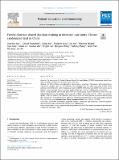Files in this item
Family-clinician shared decision making in intensive care units : cluster randomized trial in China
Item metadata
| dc.contributor.author | Liu, Xinchun | |
| dc.contributor.author | Humphris, Gerald | |
| dc.contributor.author | Luo, Aijing | |
| dc.contributor.author | Yang, Mingshi | |
| dc.contributor.author | Yan, Jin | |
| dc.contributor.author | Huang, Shaohua | |
| dc.contributor.author | Xiao, Siyu | |
| dc.contributor.author | Lv, Ailian | |
| dc.contributor.author | Wu, Guobao | |
| dc.contributor.author | Gui, Peigen | |
| dc.contributor.author | Wang, Qingyan | |
| dc.contributor.author | Zhang, Yudong | |
| dc.contributor.author | Yan, Yaxin | |
| dc.contributor.author | Jing, Nie | |
| dc.contributor.author | Xu, Jie | |
| dc.date.accessioned | 2022-06-15T12:30:02Z | |
| dc.date.available | 2022-06-15T12:30:02Z | |
| dc.date.issued | 2022-06-01 | |
| dc.identifier | 276266672 | |
| dc.identifier | e0962747-e3ee-40e9-af69-8c9b34df3081 | |
| dc.identifier | 85117185165 | |
| dc.identifier | 000809718300019 | |
| dc.identifier.citation | Liu , X , Humphris , G , Luo , A , Yang , M , Yan , J , Huang , S , Xiao , S , Lv , A , Wu , G , Gui , P , Wang , Q , Zhang , Y , Yan , Y , Jing , N & Xu , J 2022 , ' Family-clinician shared decision making in intensive care units : cluster randomized trial in China ' , Patient Education and Counseling , vol. 105 , no. 6 , pp. 1532-1538 . https://doi.org/10.1016/j.pec.2021.10.004 | en |
| dc.identifier.issn | 0738-3991 | |
| dc.identifier.other | RIS: urn:467F8534206E99DFFF78F7C83D920F71 | |
| dc.identifier.other | ORCID: /0000-0002-4601-8834/work/114641132 | |
| dc.identifier.uri | https://hdl.handle.net/10023/25535 | |
| dc.description | We thank the China Medical Board, which financially supported our study. | en |
| dc.description.abstract | Objective To investigate if a Family-Clinician Shared Decision-Making (FCSDM) intervention benefits patients, families and intensive care units (ICUs) clinicians. Methods Six ICUs in China were allocated to intervention or usual care. 548 patients with critical illness, 548 family members and 387 ICU clinicians were included into the study. Structured FCSDM family meetings were held in the intervention group. Scales of SSDM, HADS, QoL2 and CSACD were used to assess families’ satisfaction and distress, patients’ quality of life, and clinicians’ collaboration respectively. Results Comparing the intervention group with the control group at post-intervention, there were significant differences in the families’ satisfaction (P =0.0001), depression level (P =0.005), and patients’ quality of life (P =0.0007). The clinicians’ mean CSCAD score was more positive in the intervention group than controls (P < 0.05). There was no significant between-group differences on ICU daily medical cost, but the intervention group demonstrated shorter number of days’ stay in ICU (P=0.0004). Conclusion The FCSDM intervention improved families’ satisfaction and depression, shortened patients’ duration of ICU stay, and enhanced ICU clinicians’ collaboration. Practice implications Further improvement and promotion of the FCSDM model are needed to provide more evidence to this field in China. | |
| dc.format.extent | 23 | |
| dc.format.extent | 2178051 | |
| dc.language.iso | eng | |
| dc.relation.ispartof | Patient Education and Counseling | en |
| dc.subject | Shared decision-making | en |
| dc.subject | Family meeting | en |
| dc.subject | Critically ill patient | en |
| dc.subject | Family | en |
| dc.subject | Randomized trial | en |
| dc.subject | R Medicine (General) | en |
| dc.subject | NDAS | en |
| dc.subject | NIS | en |
| dc.subject | MCC | en |
| dc.subject.lcc | R1 | en |
| dc.title | Family-clinician shared decision making in intensive care units : cluster randomized trial in China | en |
| dc.type | Journal article | en |
| dc.contributor.institution | University of St Andrews. School of Medicine | en |
| dc.contributor.institution | University of St Andrews. Sir James Mackenzie Institute for Early Diagnosis | en |
| dc.contributor.institution | University of St Andrews. WHO Collaborating Centre for International Child & Adolescent Health Policy | en |
| dc.contributor.institution | University of St Andrews. Population and Behavioural Science Division | en |
| dc.contributor.institution | University of St Andrews. Health Psychology | en |
| dc.identifier.doi | 10.1016/j.pec.2021.10.004 | |
| dc.description.status | Peer reviewed | en |
This item appears in the following Collection(s)
Items in the St Andrews Research Repository are protected by copyright, with all rights reserved, unless otherwise indicated.

